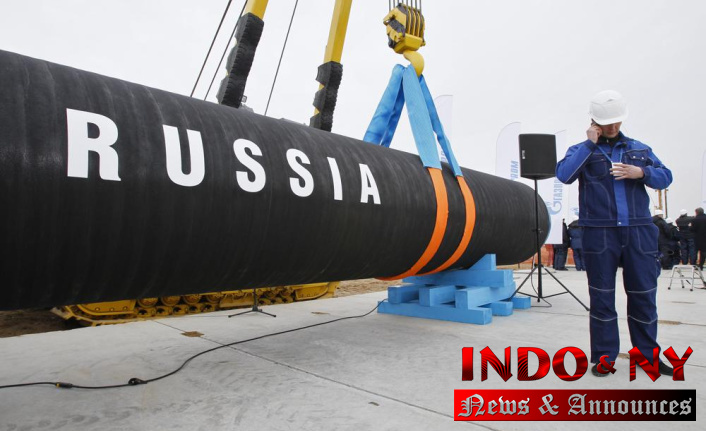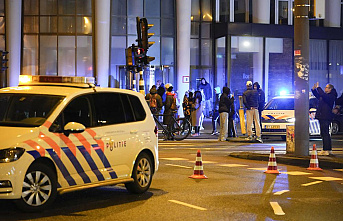After years of slow progress on a "energy union", a 2015 vision that allows affordable gas and electricity flow across borders, diversifying suppliers, and meeting climate goals, the crisis shows Europe's vulnerability. As renewables such as solar and wind slowly build up, and coal and other fossil fuels disappear, Europe still requires natural gas. Russia is the only source of it.
This was made more apparent as Europe's gas supply fell and prices rose partly because Russia sold fewer gas than normal. This squeezed households and businesses with increasing costs.
The EU is focusing on liquefied natural gases (or LNG) by ship from the United States and Qatar until renewables catch up. The EU's goal to eliminate fossil fuels could be hampered if this is made a priority.
A double down on renewables would reduce dependence on Russian gas, EU Energy Commissioner Kadri SIMSON said Monday. However, she reiterated that energy security is crucial. She said Tuesday that an advisory group was being formed to coordinate EU gas supply security. This was because she believes it is important to have contingency plans in place for the worst case scenario.
Ursula Von der Leyen, President of the European Commission, said Saturday that the 27-nation EU was "on the safe side" for winter but is doing "everything to get rid off this dependency." Gazprom, Russia's state-owned giant of gas, was accused by Von der Leyen of "deliberately trying store and deliver as much as possible" while demand and prices are soaring.
Russia fulfilled its long-term contracts, but did not sell any additional gas on spot markets. Meanwhile, Germany pushed for approval of the controversial Nord Stream 2 pipeline. This was seen as a solution to Europe's gas shortage. After Russia's recognition of independence from the Ukrainian separatist regions, Chancellor Olaf Scholz announced Tuesday that Germany had suspended the certification process for the pipeline.
According to an English translation, Russian Energy Minister Nikolai Shulginov stated Tuesday that "we are aware of the low resources gas in European countries," according to a statement he made at a forum for gas producers in Qatar. He stated that long-term gas contracts reduce price volatility and that Russian companies are fully committed to fulfilling existing agreements.
Security analysts believe that Russia would not be interested in a complete gas cutoff if it was involved in a war. This would reduce Russia's revenue and give Europe an incentive to seek other sources of energy.
Lithuania and Poland managed to decrease Russian gas imports. Russia is responsible for more than a third of EU's gas supply. Its dominance is also rooted in the Baltic States, Germany, Italy, and other parts of southeastern Europe.
The main problem is that 27 EU countries have substantial control over energy policies. Transporting gas from one country to another is difficult due to clashing regulations and standards, even if the network exists. For example, energy companies that transport gas across countries are often charged additional tariffs.
Miguel Arias Canete (ex-EU energy and climate commissioner) said that energy interconnection in Europe was an unresolved problem. He also oversaw a proposal to expand gas infrastructure.
He said that "it's in times of crisis that it's necessary for market integration, sufficient infrastructure from a procurement and security point of view", and that renewables should not be overlooked.
In 2015, Russia took the Crimea region of Ukraine. The EU's 2015 energy union plan enshrined diversifying energy supplies as a way to decrease Russian dependence. There has been significant progress since then: More pipeline connections have been constructed and more LNG import terminals are being planned.
A new pipeline will transport gas from Azerbaijan via Turkey and Greece to western Europe. A planned extension of the pipeline from northeast Greece to south Bulgaria would reduce Bulgaria's dependence on Russian gas. Greece is moving ahead with plans to construct a facility that can import LNG by sea.
However, connecting Europe's energy markets is not being done well, according to Simone Tagliapietra (energy policy expert at the Bruegel think-tank in Brussels). He said that a Spanish-France pipeline connection was abandoned, which left "a major bottleneck" that we couldn't solve. Gas industry groups are now discussing the possibility of reviving this idea.
After the Crimea crisis, energy security was replaced by climate change. This led to the EU's 2019 Green Deal which is a broad-based plan to reduce emissions.
Tagliapietra stated that "Energy Security disappeared". It was all about sustainability and decarbonization. We are now seeing the return of energy security in Europe.
This question seems to be more pressing among eastern EU members who have bitter memories of Russian dominance during the Cold War.
Poland has been working to connect pipelines with neighbouring countries, including the Baltic Pipe which will deliver Norwegian gas to Denmark and other countries starting in 2023. The country has also built the Swinoujscie LNG port at the Baltic Sea, close to the German border. The facility has reduced Russia's gas imports via the Yamal pipeline by more than a third to less than 60% since 2015.
The Yamal agreement expires in 2020. Polish authorities have pledged not to extend it. They rely on LNG from Australia, Qatar, the U.S. and other countries.
Tagliapietra stated that if billions are invested in new pipelines and import terminals, they could become obsolete with the long-term shift towards renewables. He suggested that Europe might require gas companies to start the winter with sufficient storage.
Russia's Gazprom did not fill its underground storage in Europe last year. Tagliapietra stated that it was up to the Europeans to decide and that this is unacceptable.
The governments are also discussing the creation of a strategic gas reserve, which could be shared between several countries or coordinated at the EU level. Since the 1970s, energy-consuming countries have done this with crude oil.
According to environmentalists, the solution is not more gas but actions to promote renewables.
Elif Gunduzyeli (climate activist for fossil fuels), said that "it is a little bit surreal, and surprising." "Adding more gas to the grid in order to solve the energy supply problem is like adding another lane on a highway to address the traffic problem: it becomes more complicated as more cars arrive."
She stated that "Getting disconnected from Russia and connected to the U.S. doesn't solve any of the EU’s energy security problems." It doesn't address the climate emergency.












